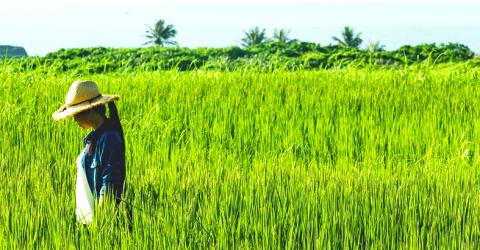There is nothing fancy about Wawa No Cidal (太陽的孩子). It tells the straightforward story of an Amis woman trying to re-cultivate the farmland in her ancestral village. As simple as the production is, the film is also one of the most genuine and sincere works of filmmaking that have come out this year. Directing duo Cheng Yu-chieh (鄭有傑) and Lekal Sumi turn their lens to an Amis village on Taiwan’s east coast, creating a heartfelt human drama tackling the issues that are very close to the heart of anyone who is concerned with what has happened to the country’s indigenous communities.
The film begins with Panay, played by Amis musician and TV host Ado Kaliting Pacidal, returning home to the Amis community Makutaay in Hualien County. Like most villagers, Panay works in the city, leaving her daughter Nakaw (Dongi Kacaw) and son Sera (Rahic Gulas) in the care of her father, played by village elder Kaco Lekal.
Her father’s recently diagnosed cancer, however, forces Panay to rethink her priorities. She quits her job and moves back to the village to care for her family. But she soon finds out that her home is not what it used to be.

Photo courtesy of Activator Marketing
For one thing, exploitative tourism has caused damage to the environment and disrupted the local way of life. Many villagers now make money by singing and dancing to the influx of Chinese visitors who bring trash, noise and traffic jams to the once tranquil hamlet by the sea. Meanwhile, the development frenzy grips the region as local authorities and big corporations join forces to build parks and resorts on Amis ancestral land.
In an effort to help villagers gain more sources of income, Panay explores the possibility of re-cultivating the tribal farmland that has lain fallow for years. Her plan elicits doubts and suspicion among residents, while local bureaucrats prefer to support big, lucrative development projects instead of spending a few bucks on fixing dilapidated irrigation canals.
Determined, Panay manages to get a small university research grant and successfully persuades villagers to work together to restore the terrace to its former glory. Rice grows, turning the field into a lush vista of verdant green.
But little do the villagers know that the developer, backed up by the police, has other plans in mind.
A sense of authenticity permeates Wawa No Cidal. The mostly non-professional actors are Amis who face the same real-life dilemma as the characters in the film. The directors tackle the complex problems facing Taiwan’s indigenous communities.
The level of eloquence and lucidity partially owes to young filmmaker Sumi. Having grown up in Tainan, the director has reportedly returned to Makutaay, the birthplace of his mother, to seek his indigenous roots. His experience is no doubt told through the character of Panay, who not only returns home to reconnect with her heritage but is driven to earn the acceptance and trust of her people.
Consequently, the film is mostly based on real events. One seemingly far-fetched sequence in the film, for example, refers to the controversy a few years ago in which the local government seized Aboriginal land in Makutaay because the township office managed to lose the documents concerning the villagers’ applications for registering their land as a reserve.
Despite a somewhat flawed narrative and low production values, Wawa No Cidal is recommended to anyone who wishes to gain a basic understanding of the issues facing the country’s indigenous communities.

Towering high above Taiwan’s capital city at 508 meters, Taipei 101 dominates the skyline. The earthquake-proof skyscraper of steel and glass has captured the imagination of professional rock climber Alex Honnold for more than a decade. Tomorrow morning, he will climb it in his signature free solo style — without ropes or protective equipment. And Netflix will broadcast it — live. The event’s announcement has drawn both excitement and trepidation, as well as some concerns over the ethical implications of attempting such a high-risk endeavor on live broadcast. Many have questioned Honnold’s desire to continues his free-solo climbs now that he’s a

As Taiwan’s second most populous city, Taichung looms large in the electoral map. Taiwanese political commentators describe it — along with neighboring Changhua County — as Taiwan’s “swing states” (搖擺州), which is a curious direct borrowing from American election terminology. In the early post-Martial Law era, Taichung was referred to as a “desert of democracy” because while the Democratic Progressive Party (DPP) was winning elections in the north and south, Taichung remained staunchly loyal to the Chinese Nationalist Party (KMT). That changed over time, but in both Changhua and Taichung, the DPP still suffers from a “one-term curse,” with the

Jan. 26 to Feb. 1 Nearly 90 years after it was last recorded, the Basay language was taught in a classroom for the first time in September last year. Over the following three months, students learned its sounds along with the customs and folktales of the Ketagalan people, who once spoke it across northern Taiwan. Although each Ketagalan settlement had its own language, Basay functioned as a common trade language. By the late 19th century, it had largely fallen out of daily use as speakers shifted to Hoklo (commonly known as Taiwanese), surviving only in fragments remembered by the elderly. In

William Liu (劉家君) moved to Kaohsiung from Nantou to live with his boyfriend Reg Hong (洪嘉佑). “In Nantou, people do not support gay rights at all and never even talk about it. Living here made me optimistic and made me realize how much I can express myself,” Liu tells the Taipei Times. Hong and his friend Cony Hsieh (謝昀希) are both active in several LGBT groups and organizations in Kaohsiung. They were among the people behind the city’s 16th Pride event in November last year, which gathered over 35,000 people. Along with others, they clearly see Kaohsiung as the nexus of LGBT rights.